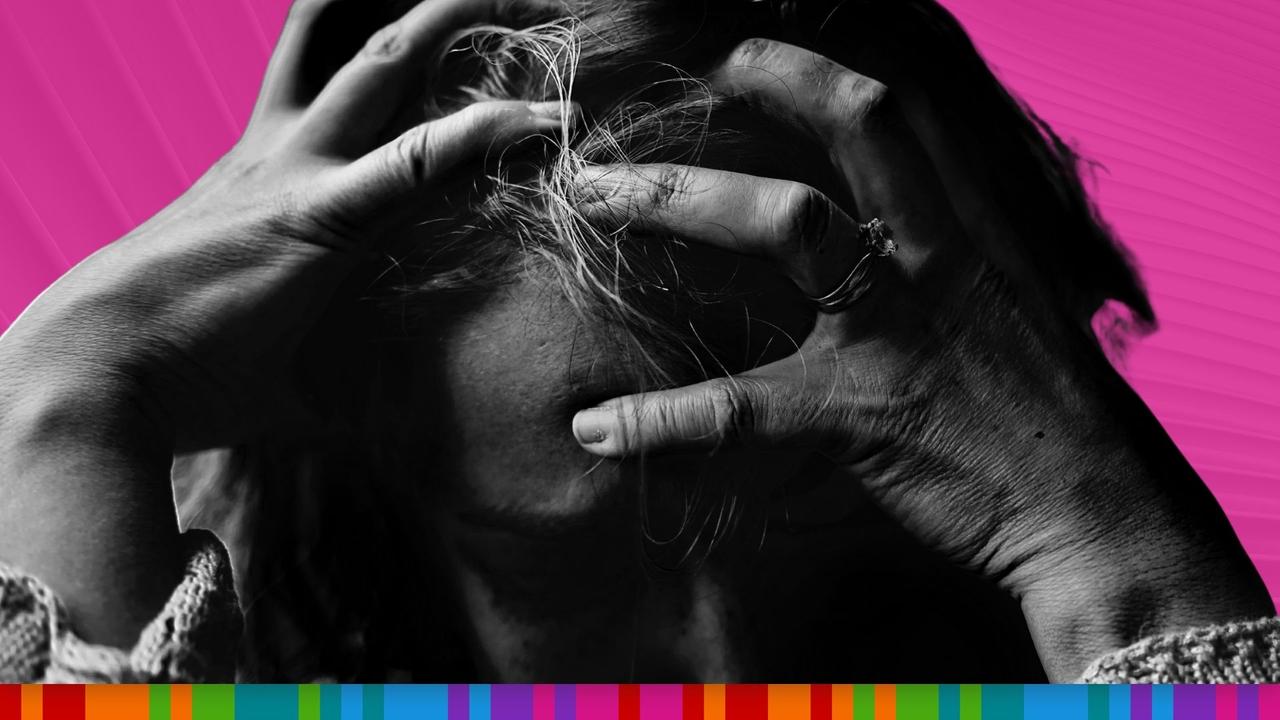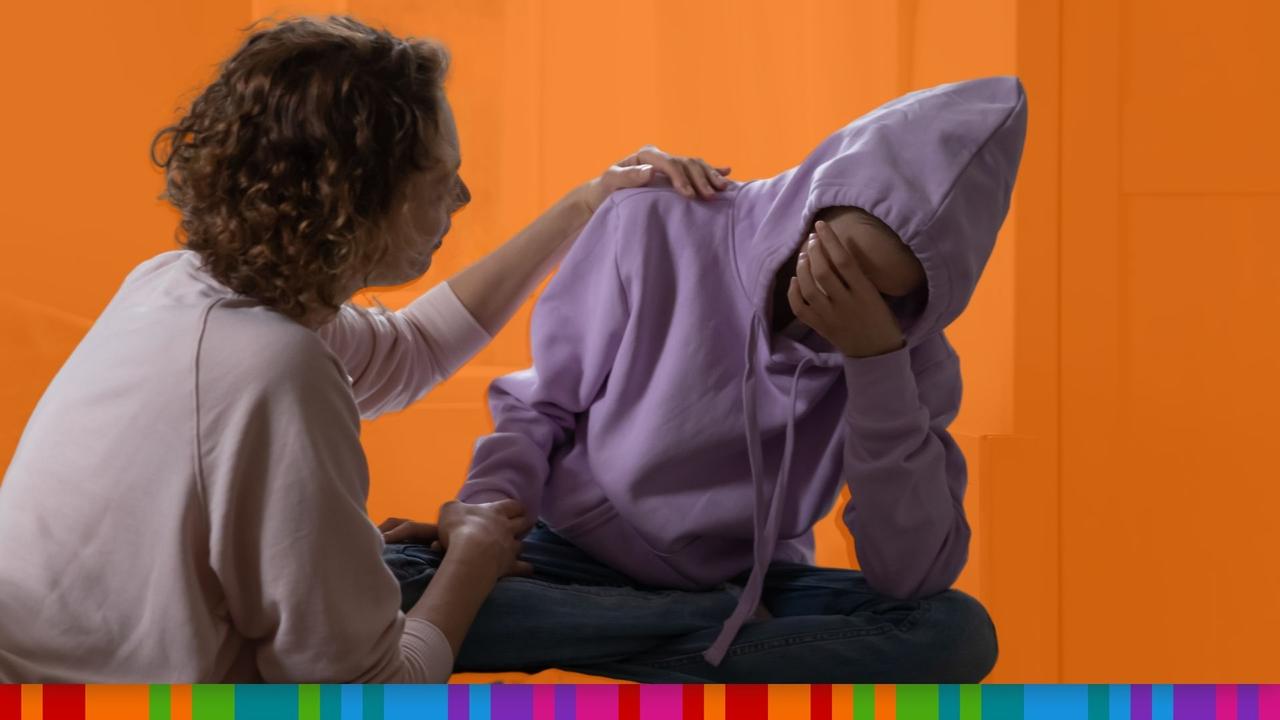How you can help a young person struggling with mental health
If someone told you they were struggling, would you know what to do? Here are some simple steps every Aussie should know.
People who have struggled with mental health often say one of the key things that helped them was having people to talk to about what they were going through.
The stigma around mental health is slowly being overturned, and young people especially are becoming more aware about how important it is to reach out when they aren’t feeling well and to regularly check in with others.
“When a young person experiences good mental health, it helps them be resilient, flexible,
adaptable and socially connected,” Headspace national clinical advisor Rupert Saunders told news.com.au.
“Feeling down, tense, angry, anxious or moody are all normal emotions, but when these feelings persist for at least a few weeks, or begin to interfere with daily life, they may be part of a mental health concern.
“If you think your young person’s experience of mental health challenges are impacting on their daily life, it is important to let them know you are there to support them and that there’s support available.”
Mental health and suicide are not easy subjects to talk about, but news.com.au wants you to know you’re Not Alone. News.com.au’s Not Alone will raise awareness about these issues and provide you with the resources needed to reach out for help.
However, knowing the right things to say and do is not always easy, and the proper response can change depending on the relationship you have with the person.
Mental health and suicide can be difficult subjects to talk about, but with suicide the leading cause of death among Australians aged 15-24, it’s a conversation that can’t be ignored.
This is how you can support the mental health of the young people in your life, whether as a parent, friend, teacher or just as a fellow Aussie.

What you can do as a friend
Sometimes it can be difficult to find the right words to say when you suspect a friend might be struggling with their mental health.
Even if they tell you outright that they are not feeling OK knowing how to provide them with the best support possible isn’t always easy.
One of the simplist things you can do is just check in with a friend and let them know you are there to help them.
If your friend confides in you that they are struggling then the next thing to do is just listen to them and try not to judge or “fix things” straight away.

Youth mental health organisation Headspace says that to someone going through a tough time, even just telling another person about it can be a big relief.
“Some friends might need time and space before they feel ready to get support,” Headspace suggests.
“You may need to be patient with your friend. Don’t judge them or get frustrated if they don’t take you up on your offer of support. Remind them that you are there if they need you and give them time.”
You can also encourage them to talk to a trusted adult about how they are feeling and try some self-help strategies such as eating well, exercising, writing their feelings down and doing things they enjoy.
Sometimes your friend might need a bit of extra help, in this case you can encourage them to make an appointment with their GP or call one of the many support organisations available, such as Headspace, Kids Helpline and Lifeline.
If you go through all of these steps and your friend doesn’t want to get help but you are still concerned about them, then you may need to tell their family or a trusted adult about the situation.
“You have to strike the right balance between your friend’s right to privacy and the need to make sure they are safe,” Headspace suggests.
“If you decide to tell someone else, try to let your friend know first that you are planning on doing this.”
If you are worried that you friend needs urgent medical help or is at risk of hurting themselves or someone else, you need to tell someone immediately, even if they have asked you not to.
This could mean contacting triple-0, or telling a parent or teacher.
What you can do as a parent or carer
Most parents and carers will do everything in their power to ensure the mental wellbeing of their child, but sometimes it’s no easy task to get them to open up about how they are really feeling.
The first step is identifying that there might be a problem. According to Kids Helpline, these are some warning signs that your child may need extra support:
• Not acting like themselves and avoiding people or social situations they used to enjoy
• They aren’t performing as well at school as they used to
• Self-harming or drug and alcohol abuse
• Feeling hopeless about the future
• Changes in sleeping or eating
• More emotional than usual (anger, worry, sadness, crying)
• Lacking energy or motivation to do everyday tasks

Kids Helpline says it is normal for parents and carers to feel stuck or confused about how to help, but encourages people not to be afraid to have a conversation about it.
“Choose a quiet place and a time where you’re both relaxed. Try and ask, ‘Is there anything you wanted to talk about? You haven’t really seemed yourself lately’,” Kids Helpline suggests.
“If they aren’t ready to talk things through it’s OK. Try not to push.
“Take their feelings seriously; if your child shares that things aren’t OK, get professional support – especially if your child talks about feeling hopeless and/or thoughts of suicide.”
Knowing your child is struggling is distressing and can have a major impact on your own mental health, so it is important that you take steps to look after yourself as well.
Reaching out for professional support is one of the most important things you can do for you and your child’s wellbeing.
Parentline is a great resource for parents and carers and have helplines for every state and territory.
What you can do as a teacher
As a teacher, you may be the trusted adult a child turns to when they are struggling with their mental health.
When a student turns to you for help, you will obviously want to do all you can to assist them, but unless you are a trained counsellor or mental health expert, it can be difficult to know what to do.
Mental health support organisation ReachOut says one of the first steps is to listen to what the child has to say and be non-judgemental and patient when they are speaking about the issue at hand.
The next step is to know how and when to go to others for help.

“Encourage the student to seek help themselves. They may feel supported if you offer to go with them when they speak with a school counsellor or welfare advisor,” ReachOut suggests.
“If you feel like the problem is serious or you have concerns for the student’s welfare you must report it to your principal. As mandatory reporters, teachers are required to report situations where they believe a young person is at risk of harm.”
Sometimes a student won’t reach out for help, but there are signs that you can look out for that may indicate they are struggling, including:
• constantly thinking or talking about their problem/s
• acting very out of character (e.g. a quiet person becoming loud and wild or an outgoing person becoming really quiet)
• unexpected outbursts of emotion
• using drugs or alcohol
• avoiding friends and social events that they would normally be part of
• acting or talking like no one cares about them or threats or talk of killing themselves
ReachOut suggests not being afraid to raise your concerns with the student in question, adding it may result in them feeling a “sense of relief that someone has noticed and cares enough to ask how they are going”.
“If your concerns are confirmed, then it is important to inform the appropriate staff within the school to ensure that the student receives the help and support they need to stay safe,” the organisation says.
“Each school will have policies that identify the processes for notifying a concern about risk of harm to a student.”




